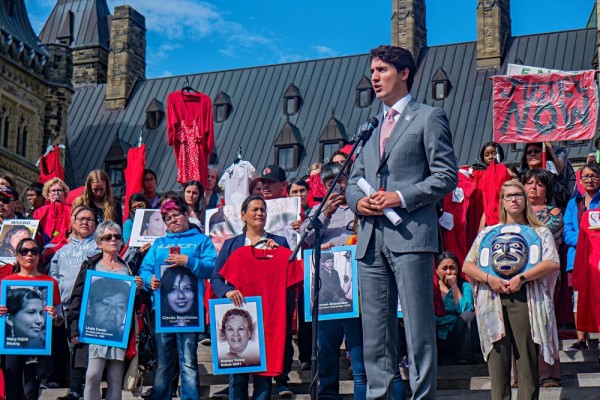Manitoba NDP doubles down on failed ‘tough-on-crime’ agenda
Wilt: The NDP should instead commit resources to life-sustaining investments in education, housing and other social services

Manitoba Premier Wab Kinew announces a bail reform plan for the province on February 29, 2024. Photo courtesy Government of Manitoba.
As the one-year anniversary of the Manitoba NDP’s October 2023 election victory nears closer, major question marks remain around Premier Wab Kinew’s priorities for his first term in office. After campaigning on fixing the health care system the Conservatives gutted in the years before the pandemic, provincial funding remains dismally insufficient. Now, many thousands of unionized health support workers represented by both the Manitoba Government and General Employees’ Union (MGEU) and the Canadian Union of Public Employees (CUPE) are in strike positions over wages that are among the lowest in the country.
The NDP’s supposed commitment to unions and public services is already clashing with its fiscal policy of regressive tax cuts and ambitions to balance the provincial budget. Kinew is now invoking the routine right-wing talking point of “belt-tightening” ahead of the next provincial budget, seeming to confirm his 2015 assertion that “on fiscal issues, I would be 100 percent open to a Conservative platform.”
One policy terrain on which Kinew’s NDP has been totally unambiguous, however, is “crime” and “justice.” Building on its already dubious legacy on this file—both during its time in power between 1999 and 2016 and while in opposition between 2016 and 2023—the Manitoba NDP is accelerating a reactionary program of policing and jailing, driven largely by the interests of the Winnipeg Police Service (WPS) and the city’s business community. This program has combined major funding commitments, policy changes, and added “layered policing” that deepens law enforcement presence in community spaces. Far from improving safety, though, this campaign will divert resources away from programs and initiatives that would meaningfully reduce violence and harm, especially for Indigenous and racialized people. Kinew’s commitment to expanding criminalization and deepening funding for police represents a callous abandonment of the reforms that are urgently needed—particularly in housing, mental health and other social support services.
Below is an overview of the major funding and policy announcements made so far:
New funding for “bail reform” (February 29, 2024): Despite “deep-seated and persistent” issues in Canada’s bail system—with upwards of three-quarters of Manitoba’s prisoner population being held in pre-trial detention—the NDP ushered in police-demanded changes that awarded the WPS an additional $3 million in annual funding to hire a dozen more cops to “track down offenders who violate their bail conditions.” While vague, just over $1 million more was committed to bail-related “data and intelligence” gathering and “enhancing community monitoring and supervision.” This announcement was publicly endorsed by the National Police Federation and the WPS, and criticized by the Assembly of Manitoba Chiefs.
Provincial budget massively increases spending on police (April 2, 2024): The NDP’s first budget quietly increased spending on provincial policing by almost $30 million, with about half going towards “urban policing grants.” This huge funding boost was described as “the first budgeted increase since 2017, and better reflects current costs of delivering police services to all Manitobans.” It can be assumed that much of the recent spending on policing is being drawn from this huge pot, although there’s no transparent reporting about it. Winnipeg’s most recent city budget reported an almost 60 percent increase in provincial funding to the WPS (from $19 million in 2023 to over $30 million in 2024) including millions more for police involvement in “downtown safety,” missing persons response, and a recently revived warrant apprehension unit.
New laws to crack down on alleged “drug traffickers and organized criminals” (April 5, 2024): Cops already have countless powers to surveil and harass people, but the NDP opted to further expand them with an “Unexplained Wealth Act” and a “Body Armour and Fortified Vehicle Control Act.” So-called unexplained wealth orders have been criticized by the BC Civil Liberties Association for functioning to “erode privacy rights, undermine the presumption of innocence, and subvert the rights that shield people from unreasonable search and seizure.” This announcement was publicly supported by the WPS and Manitoba Association of Chiefs of Police. Importantly, these new laws reflect a broader police-led discursive pivot to demonizing drug producers and sellers, which itself obfuscates the reality that the leading cause of drug-related harm is a toxic drug supply that can most effectively be solved through a legal and regulated supply of drugs (which the police oppose).
Quasi-cop force implemented at Manitoba’s largest hospital (April 15, 2024): So-called “institutional safety officers” (ISOs) were inaugurated following the previous PC government’s amendments to the Police Services Act. Designed for use in hospitals and post-secondary institutions, these police-trained security guards can be equipped with batons, pepper spray, and the power to detain and arrest as well as to conduct searches and seizures. The NDP announced that ISOs would start patrolling the Health Sciences Centre (HSC) in mid-April as the first step toward rolling them out in hospitals across the province. Despite a labour arbitrator refusing to issue an order for ISOs in HSC to carry batons and pepper spray as there was “no evidence on the efficacy of such weapons,” and Shared Health expressing “concerns about the potential use of pepper gel in a hospital,” Health Minister Uzoma Asagwara issued a directive that ISOs be trained and equipped with pepper spray.
Paying police overtime for “retail and violent crime initiative” (May 29, 2024): In response to the city’s latest “crime panic” of retail theft—which is likely related to the skyrocketing cost-of-living and widening food insecurity—the NDP announced that it would cover WPS overtime to patrol retail areas like Osborne Village and the Exchange District. Costing just shy of $400,000 for June alone, the government then extended it until the end of August at a total cost of $1.2 million (the province later allocated $774,000 to extend the program through September and October). This clear public subsidy for the business community has been publicly supported by the WPS and many private interests including the Winnipeg Chamber of Commerce.
Subsidizing security systems for homes and businesses (June 28, 2024): The NDP first announced a $500,000 rebate program in late June, allowing tenants, homeowners, and business owners to apply for a $300 subsidy to install everything from security and doorbell cameras, to alarm systems and motion detectors, to reinforced doors and security fencing. Given continued concerns about theft and break-and-enters, it’s no wonder the rebates ended up being wildly popular, leading the NDP to quadruple funding for the program to $2.5 million in mid-August. Justice Minister Matt Wiebe explicitly cited police support for this program as a motivation, framing it as a sizable expansion of surveillance powers as, “now all of a sudden they have more points of information that they can gather,” and police using the “footage that people have collected to have an impact on public safety.” The expanded budget for the rebate program was used up in less than two weeks. Although now paused, Wiebe suggested it could be soon relaunched with more funding, with Chamber of Commerce CEO Chuck Davidson calling for the program to have a dedicated pot for business owners.
Funnelling criminal forfeiture funds to the Brandon Police (July 12, 2024): Continuing the long trend of diverting “proceeds of crime” back to police forces—instead of individual victims or victim service agencies—the NDP awarded $270,000 through the Criminal Property Forfeiture Fund to the Brandon Police for the purposes of buying drug-testing and other emergency medical equipment and funding mental health supports for police officers. There was no explanation as to why the police should receive such funding instead of, say, harm reduction organizations and survivors of police violence.
Reinstating ankle monitoring (August 14, 2024): Despite a review of ankle monitoring commissioned by the last NDP government, which concluded that the surveillance technology was “either inaccurate or ineffective,” the new NDP government has resuscitated them at the cost of $2.9 million over the next two years for the stated purpose of monitoring people on bail and reducing retail theft. As the American Civil Liberties Union has explained, ankle monitoring “expands mass incarceration, operating as a form of digital incarceration known as e-carceration, and leading people to physical jails and prisons for minor technical violations, charging malfunctions, and false alarms.” The announcement was publicly supported by the WPS and the Retail Council of Canada. Again criticizing NDP “crime” policy, the Assembly of Manitoba Chiefs argued that “addressing these underlying issues should be the priority, rather than expanding surveillance measures that risk further criminalizing our people.”
The party’s doubling down on pro-police policies is in some ways unsurprising given Kinew’s past rejection of divestment rhetoric and the party’s “tough on crime” election pledges. It also flies in the face of past statements by numerous NDP MLAs who have previously taken far more progressive positions on law and order. Health Minister and Deputy Premier Uzoma Asagwara was formerly involved in organizing that was critical of police, including hosting Policing Black Lives author Robyn Maynard at a 2017 event and speaking at the massive Justice 4 Black Lives Winnipeg rally in 2020. Also in 2020, while standing in front of a half-dozen NDP MLAs, Kinew spoke at a rally demanding justice for Eishia Hudson, the 16-year-old Indigenous girl who shot and killed by the WPS, promising significant policing reforms if his party formed government. Families Minister Nahanni Fontaine was even described in 2010 as “one of Manitoba’s most outspoken critics on policing.”
Whatever the case, it is clear the NDP is unleashing a barrage of new law and order policies while managing to avoid much in the way of public or media backlash. Making matters worse is that these “tough-on-crime” policies are being taken up by ostensible social democrats in other provinces. The CBC reports that the Saskatchewan NDP is “using some of the same promises and strategies the now governing Manitoba NDP employed last year,” including campaigning on the security system rebate and “unexplained wealth” crackdowns.
The devastation of criminalization disproportionately harms Indigenous peoples, further worsening access to housing, income, and community supports. Whatever positive things the province opts to do, like funding an Indigenous-led safe consumption site in Winnipeg, will be systematically undermined by expanded policing powers that hijack ever-more resources that could be used for public good.
Indeed, the party’s long-recited mantra of being “tough on crime and tough on the causes of crime” is fundamentally contradictory. Every NDP announcement that expands the funding, powers, and surveillance capacities of police works to entrench a system that is not empirically proven to reduce crime or make communities safer. What is needed, as always, is evidence-based policy that produces long-term safety for all by instead doubling down on life-sustaining investments in youth, education, housing and other social services.
James Wilt is a Winnipeg-based PhD candidate and freelance writer. His next book, Dogged and Destructive: Essays on the Winnipeg Police, comes out in September 2024.










